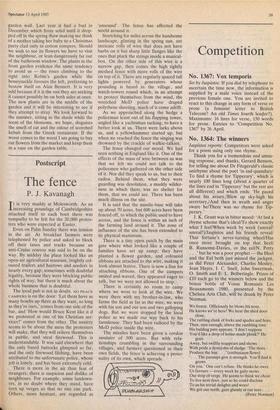Postscript
The fence
P. J. Kavanagh
Tt is very muddy at Molesworth. As an 'increasing poundage of Cambridgeshire attached itself to each boot there was sympathy to be felt for the 20,000 protes- ters who were expected at Easter.
Even on Palm Sunday there was tension in the air. At breakfast farmers were telephoned by police and asked to block off their lanes and tracks because an anti-Cruise convoy was said to be on the way. By midday the place looked like an open-air agricultural museum, brightly col- oured trailers and harrows and seeders in nearly every gap; sometimes with doubtful legality, because they were blocking public rights of way, but there is much about the whole business that is doubtful.
The local pub is not in doubt. NO PEACE CAMPERS is on the door: 'Let them have as many bombs up there as they want, so long as they're ours,' comes from one side of the bar, and 'How would Bruce Kent like it if we protested at one of his Christian ser- vices?' comes from the other. The anxiety seems to be about the mess the protesters will make, that they will relieve themselves in public, and steal firewood. This is understandable. It was said elsewhere that the only bared buttocks glimpsed so far, and the only firewood filching, have been attributed to the unfortunate police, whose job is lonely, and has been extremely cold.
• There is more in the air than fear of strangers; there is suspicion and dislike of neighbours. For example, some landown- ers, in no doubt where they stand, have torn up verges so that no one can park. Others, more hesitant, are regarded as 'unsound'. The fence has affected the world around it.
Stretching for miles across the handsome landscape, glinting in the spring sun, are intricate rolls of wire that does not have barbs on it but sharp little flanges like the ones that pluck the strings inside a musical- box. On the other side of this wire is a narrow gap, then comes the high tightly meshed fence with more rolls of the wire on top of it. There are regularly spaced tall lights powered by generators whose pounding is heard in the village, and watch-towers round which, in an attempt to protect themselves from the wind, the wretched MoD police have draped polythene sheeting, much of it come adrift.
As we approached along the hedge a policeman leant out of his flapping tower, angled like a yachtsman tacking, to have a better look at us. There were larks above us, and a yellowhammer started up, but when we reached the fence the singing was drowned by the crackle of walkie-talkies.
The fence changed our mood. We had seen nothing in England like it. One of the effects of the mass of wire between us was that we felt we could not talk to the policemen who gathered on the other side of it. Nor did they speak to us, but to their radios. Behind them, what they were guarding was desolation, a muddy wilder- ness in which there was no shelter for them, that we could see. There has been much illness on the site.
It is said that the missile-base will take up about 70 acres, but 600 acres have been fenced off, to which the public used to have access, and the fence is within an inch of the farming land around it. The zone of influence of the site has been extended to its physical maximum.
There is a tiny open patch by the main gate where what looked like a couple of families have set up camp; they have planted a flower garden, and coloured ribbons are attached to the wire, making it look almost festive. There is now a fine for attaching ribbons. One of the campers smiled and waved, they appeared eager to talk, but we were not allowed to stop.
There is certainly no room to camp where we went to look at the wire. We were there with my brother-in-law, who farms the field as far as the wire; we were with his son and our son and two galloping dogs. But we were stopped by the local police as we made our way back to his farmhouse. They had been radioed by the MoD police inside the wire.
The missiles have been given a cordon sanitaire of 500 acres. But with rela- tionships crumbling in the surrounding villages, and farmers questioned in their own fields, the fence is achieving a perso- nality of its own, which spreads.














































 Previous page
Previous page